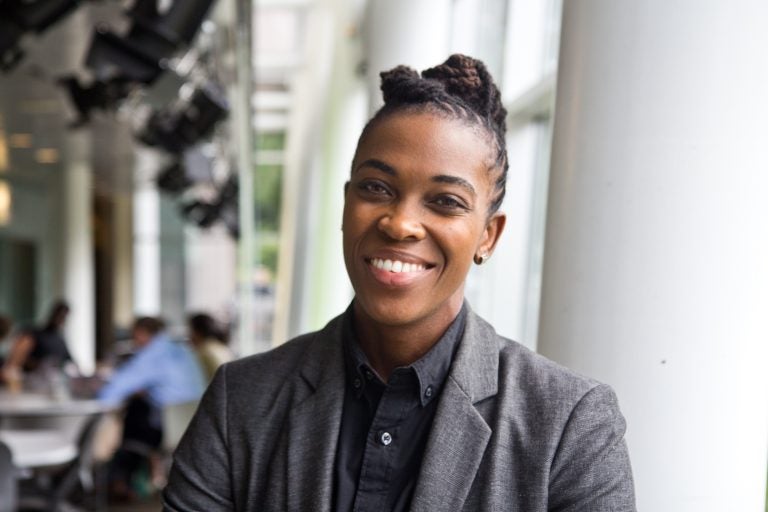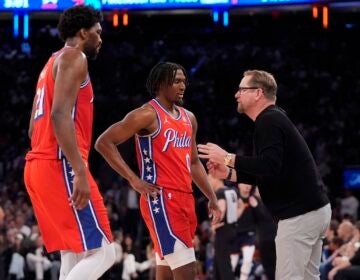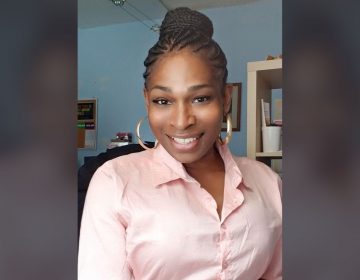Philly’s LGBTQ liaison heading to the national stage with the ACLU
After two years in the Kenney administration, Amber Hikes is departing for New York, to become chief diversity officer for the American Civil Liberties Union.
Listen 5:00
Amber Hikes, executive director of Philadelphia's Office of LGBT Affairs talks about her last day in office. (KimberlyPaynter/WHYY)
A couple of weeks ago, Amber Hikes tweeted that, with great pride and a bit of disbelief, she had accepted a position as the chief diversity officer for the American Civil Liberties Union, at its national headquarters in New York City.
Today, she cleans out her desk in Philly, where for the past two years she has served as executive director of the Office of LGBT Affairs within the Kenney administration.
Hikes stopped by this week and told WHYY’s Morning Edition host Jennifer Lynn that her days as liaison to one of the city’s most diverse social and cultural groups have been important and productive — and gave her the unique skills the ACLU was looking for.
—
What was unique about this position in the mayor’s office was that for the first time I had this unique opportunity to bring so many different backgrounds, and priorities, and experiences, and I truly had to negotiate with these different parties and entities. And I had to bring those different perspectives to the table in a way that that I don’t think, I don’t think others really have had the opportunity to do or frankly appreciate what it looks like to be at the table with with prisons and police and activists all in the same room and navigating those challenges. I learned so much about that process. I think that is going to be core to my work with the ACLU, especially when you’re talking about activists and advocates, and new activists and advocates who have just come to this work. And attorneys that have been with the ACLU for the last 40 years. Right? They were like, they were with our Ruth Bader Ginsburg when she was, you know, was a young attorney. You still have those folks that are there and really trying to find some kind of some nexus of agreement in how we approach the work. It’s going to be fascinating.
Was there something about the Kenney administration that really gave you wings to do what you needed to do in Philadelphia?
Mayor Kenney is what gave me wings. When I had my very first conversation with him before I accepted the job, he asked what I needed from him. I said the only thing I needed was for him to trust me. We are very different people. I am a 30-something black queer woman. You are a 60 — he was nearly 60 at the time — white Irish guy from South Philly. Honey, we are going to disagree on some things when it comes to this work in this community. You’re going to have to trust me even when it’s uncomfortable, and as long as you can promise that you will listen to me and trust me, we’re not going to have any problems.
When was it uncomfortable?
Almost immediately, because I came on in March and the flag happened in June.
Right.
And our relationship was tested immediately.
So this is the More Color More Pride flag.
That’s right.
Additional stripes.
That’s exactly right.
Black and brown stripes. And it’s controversial in the community.
And I told you before, I thought it was a softball, right. It’s two stripes on a flag. We have dozens of flags. To the mayor, it was a softball, but I’m here for a couple of months and he’s already getting death threats from around the world.
Did you get those?
Absolutely. Absolutely. Hate mail and death threats. He says, kid, I know I said I was going to trust you, but, good God, death threats? And I said, yeah, just trust me. He said of course I trust you. It’s two stripes on a damn flag. We’re doing the right work. But I didn’t know it was going to happen so soon.
Oh my goodness.
But he trusted me. He trusted me every step of the way.
How did you operate toward the end of your two years in Philadelphia? Can you see kind of an arc of change for you?
I think that what ended up being my greatest strength was also, I think, initially what folks would have thought was my weakness. And it was not being a bureaucrat. Not having any experience in government before I came to City Hall. Initially, people said, well, she doesn’t know how things work. She’s not going to know who to go to for this or how to navigate the system. Actually ended up being one of my greatest strengths because I didn’t wait around. Right? That was probably, I think, one of the greatest critiques of government, right, is that we just take so damn long to do everything. But when you’re not a bureaucrat, you don’t know, right, you’re not so concerned with playing that game and waiting and waiting and waiting. I pushed through the door, and before people could even realize that I was there, I was on the other side saying what’s next. And so, if there’s something that I saw develop over that time that was different from the beginning, I pushed those doors a lot faster towards the end.
I just got to the other side and was like OK, what’s next. I’m here.
WHYY is your source for fact-based, in-depth journalism and information. As a nonprofit organization, we rely on financial support from readers like you. Please give today.





